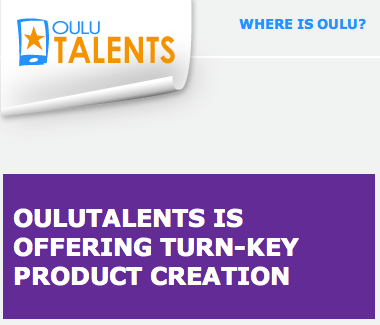Today Nokia announced that its deal to buy imaging company Scalado has been finalized — a sign of another piece of the puzzle falling into place for Nokia as it continues to restructure to reverse huge declines in handset sales. But that dark, Finnish cloud has a silver lining that we’ve been noticing: the emergence of a bunch of startups being formed by many among the 40,000 people that have been laid off. The other day we wrote about how some of the smaller players have been picking up funding from Nokia courtesy of its Bridge program. And now we’ve come across what might possibly be one of the more ambitious spin-offs yet.
Oulutalent is a team of no less than 500 former-Nokia employees based in the town of Oulu. The skills on offer, and the ready-made team, is a testament to what Nokia has had to drop by the wayside, but also what is on the market for the many tech companies out there fighting the war for talent.
Averaging more than 10 years of experience, the group claims to have “created over 50 devices including major blockbusters. In addition to devices, we have done novel cloud services and UI platforms from scratch. We are on the leading edge with touch and LTE phones, Linux and WiMax tablets and we have world-class technical competence on all.”
The group is being led by Pekka Väyrynen, an engineer who developed patented wireless technology for Nokia (that is, the patents that are reported worth up to $6 billion and may well start getting sold off to help Nokia’s cash position).
Effectively, what we have in Oulutalent is a handset-making operation that could in theory be bolted on to a company with mobile ambitions (Amazon? A new Asian entrant? Nokia’s MeeGo spinoff Jolla?); or one that is growing already and needs to expand. It plays on the big area of outsourced operations — something that may have been too expensive for Nokia to maintain may well be hard for another as well; this lets that cost stay off the balance sheet.
Oulutalent notes that it can provide a range of consulting and technical services, from identifying market opportunities and planning product portfolios; to “concepting” (covering hardware and user experience, simulation and prototyping); turning those concepts into products; and then helping with the aftersales.
One twist is that the team is not in full effect yet, with some employees still working out their terms with Nokia, according to a spokesperson for the company.
And another is whether Oulutalent will be able to prove to the market that it’s worth the investment: its success is partly dependent on whether others believe Nokia’s downfall was mainly due to some bad decisions from management; or whether it was also down to those executing on decisions.
Oulutalent is offering itself as a group for “turn-key product creation,” but there may be possibilities to engage smaller teams, too. That is the approach being taken by a similar project called Kyvyt (Finnish for “talent”). Despite its Finnish name, Kyvyt is based in the German town of Ulm, where Nokia also had a large team of people who apparently were working on its low-end Linux based platform Meltemi (another project Nokia left on the cutting-room floor). Kyvyt is offering out its pool of talent as and where it is needed, and it is also running events like job fairs, as well as posting job adverts on its site.
The Oulutalent spokesperson says that it will cooperate with Kyvyt, although declined to specify what that will mean. More detailed information, she says, will be coming out in coming weeks.
Ironically, as Nokia has been cutting staff, it’s taken a few on, too, to focus on areas where it hopes to stand out against handset competitors. The Scalado purchase will see some 50 people join Nokia’s smartphone operations in Lund, Sweden, where Nokia will be incorporating Scalado’s technologies and IP into its imaging business:
“We believe that this acquisition will strengthen Nokia’s leading position in mobile imaging and provide us with a great opportunity to create even better imaging products and applications,” Jo Harlow, executive vice president, Smart Devices at Nokia, said in a statement.
In the bigger picture, Nokia has insisted that it is safe and secure as far as cash reserves are concerned, but at the same time it’s running out of goodwill with the investment community: Nokia’s debt rating yesterday was cut once again by Moody’s, as the agency noted that losses in the current quarter will be even greater than previously thought. The three major credit agencies, Standard & Poor’s; Fitch and Moody’s have all now graded Nokia’s debt down to “junk” status.
Nokia, as before, has said that the “impact on the company is limited” with the company taking action to turn things around. The company says at the end of June it had a cash balance of €9.4 billion and a net cash balance of €4.2 billion, both higher than a year ago.
It’s not clear who is providing the capital to finance Oulutalent, although the Bridge program we wrote about before is basically restricted to startups of four people or less, so it’s unlikely to play a role here. We’re asking questions and will update as we learn more.
